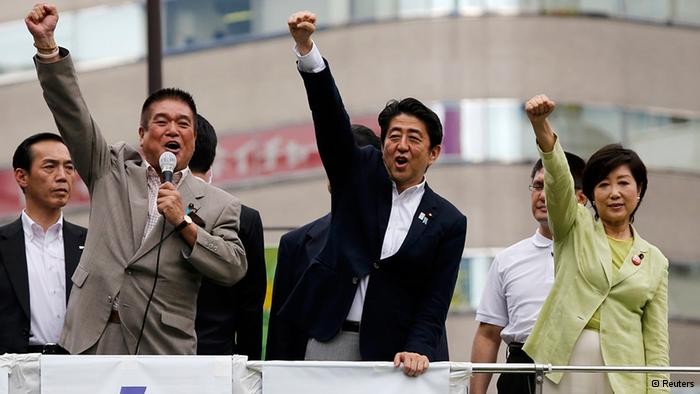(VOVworld)- Japan’s Upper House election will be held this Sunday. This is an important political event – an opportunity for the ruling Liberal Democratic Party to secure a majority in the Upper House and implement Prime Minister Shinzo Abe’s policies.
According to the Japanese Constitution, a term in the Japanese Upper House lasts 6 years and every three years, half of the seats are re-elected. About 430 candidates are running for 121 seats in this year’s election. At present, the ruling LDP and its partner, the New Komeito Party or NKP have 59 seats that are not up for re-election. But, the LDP needs to gain seats to secure a majority. In the Lower House, the LDP has an overwhelming majority, but it doesn’t yet control the Upper House. This has caused numerous difficulties for Prime Minister Shinzo Abe in getting his initiatives through the Diet. The LDP’s failure in the Upper House election in 2007 forced Abe to give up his Prime Minister seat.
 |
The LDP’s determination to win the Upper House election has been apparent in several actions: platforms matched voters’ aspirations, a promise to achieve an average economic growth rate of 2% and double farmers’ incomes within the next 10 years, a pledge to push for Constitutional revisions including amending Article 96 to loosen regulations on Constitutional amendments and an effort to gain public support for the re-activation of nuclear power plants after safety plans approved. To strengthen Japan’s industrial competitive edge, Abe’s Party promises to reduce investment taxes and work persistently toward achieving surplus between now and 2020. With regard to foreign policy, the LDP intends to move the US Marine Corps Air Station at Futenma to a less populated area. It is committed to the negotiations of a Trans-Pacific Partnership.
The LDP’s chances in the Upper House election will be helped by positive achievements Abe has made since he took office 7 months ago. The Tokyo Stock Exchange has advanced, and the Japanese yen has devalued following the Bank of Japan’s efforts to loosen monetary policy and huge outlays in the public sector.
These pluses will gain the LDP votes despite opponents’ criticisms of Abe’s economic policies, dubbed Abenomics. A Kyodo news agency poll last month showed the LDP leading all other parties with the support of 31.1% of the voters. According to polls by Yomiuri, Asahi and Mainichi, LDP’s support is between 42 and 45%, while support for the Democratic Party of Japan is only 7 to 9%. 54% of voters support Abenomics and only 31% oppose Abe’s economic policies.
The Upper House and the government of Japan have not been controlled by a single Party since 2006. This has caused difficulties for the government in implementing its policies. With LDP gains in the Upper House this Sunday, this situation is likely to improve. The LDP has a golden opportunity to gain control of both the Lower and Upper House.
Hong Van